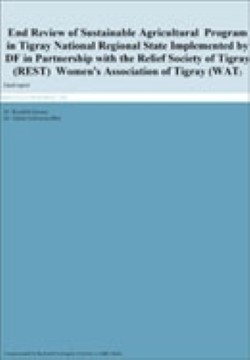End Review of Sustainable Agricultural Program in Tigray National Regional State Implemented by DF in Partnership with the Relief Society of Tigray (REST) Women's Association of Tigray (WAT)
About the publication
- Published: August 2009
- Series: Norad Collected Reviews
- Type: --
- Carried out by: Bezabih Emana and Girma Geberemedhin
- Commissioned by: Royal Norwegian Embassy Addis Abeba
- Country: Ethiopia
- Theme: Primary industry (agriculture fishing forestry)
- Pages: 58
- Serial number: 1/2009
- ISBN: 978-82-7548-413-8
- ISSN: --
- Organization: Utviklingsfondet
- Local partner: REST (Relief Society of Tigray) since 1982 and WAT (Women Association of Tigray)
- Project number: ETH-3036

The Project
The Norwegian Development Fund (DF) started cooperating with its two long time partners; REST (Relief Society of Tigray) in 1982 and WAT (Women Association of Tigray) in 1994. The three were supported under a joint program entitled "Sustainable Agriculture in Tigray National Regional State". REST implemented an Integrated Agricultural Development Project (IADP) while the capacity building and women empowerment project was implemented by WAT. The program was funded by the Royal Norwegian Embassy with a total budged of NOK 17 mill 2007-2008. The goal of the program is stated as "Improved food security of rural households in the drylands of Tigray National Regional State", under which there are five objectives (purpose):
• Increase and diversify crop and livestock production
• Rehabilitate degraded natural resources
• Increase access to clean, potable water
• Promote social and economic empowerment of women
• Improve coordination between development actors
Interesting Findings
- The program implemented by DF in collaboration with REST and WAT has made a significant contribution towards the attainment of the overall goal of improving and sustaining the livelihood of poor and vulnerable people in the intervention areas.
- The overall objective of the REST project was stated as "Ensuring the food security and rehabilitating the environment and natural resources base". The observations made at the project sites and discussions made with the project beneficiaries claim that this objective has been attained.
- It was also apparent that the project interventions consolidated and enhanced development gains and positively contributed to food security and environmental rehabilitation. Vivid impacts are observed in the improved livelihood base and welfare due to increased income generated from program activities. Moreover, the peoples' resilience to shocks and social integration increased as a result of the program activities especially the environmental rehabilitation and water resources development. The program has also increased empowerment of women and the youth as they access and control resource bases developed and created by the program.
- Activities under the institutional capacity building and women empowerment project have also contributed to the enhancement of food security at household level and reduction of gender inequality as anticipated in the overall objective of the project. More importantly, the capacity building of the beneficiary women enhanced the entrepreneurship and business skill of the target women.
- Activities of WAT which lead to empowerment of women very much complement the gender sensitive participatory approach followed by REST in its watersheds based development endeavours. Although the program design did not explicitly link the implementation of the program by the two agencies (REST and WAT), it was found that the benefits from the view point of rational use of resources in areas where both WAT and REST operate are considerable due to experience sharing among the beneficiaries.
